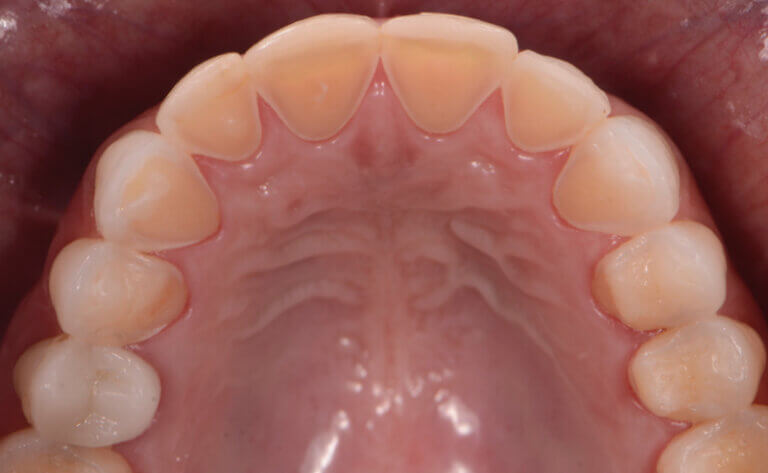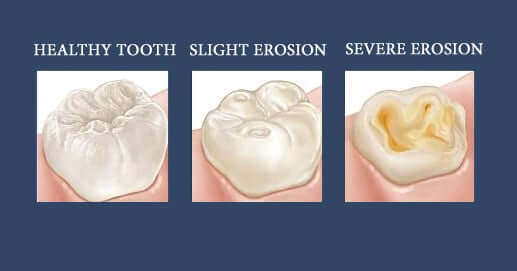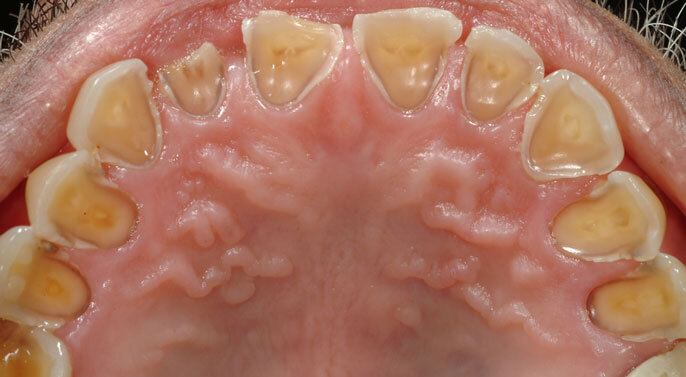Dental Erosion

What is Dental Erosion?
Have you ever noticed your teeth feeling sensitive or looking thinner than before?
This might be a sign of Dental Erosion, a common condition that occurs when acids wear away the enamel, the protective outer layer of your teeth. Unlike cavities, which result from bacterial plaque, dental erosion comes from direct exposure to acidic substances, including:
- Acidic foods and drinks (e.g., citrus fruits, soda, sports drinks)
- Stomach acid (from conditions like GERD or acid reflux)
- Frequent vomiting (as seen in bulimia or severe morning sickness)
Once enamel is eroded, it cannot regenerate, making early detection and prevention essential. Over time, dental erosion can lead to sensitivity, discoloration, and even tooth loss if left untreated. Before you contact a Toronto dentist to examine tooth erosion, there are some things you should know as a patient:
- Causes Of Dental Erosion
- Signs And Symptoms Of Dental Erosion
- Treatment Options For Dental Erosion
- Managing Dental Erosion Until You Can See The Dentist
- Frequently Asked Questions About Dental Erosion
If you have questions about Dental Erosion or other dental problems, please contact us for more information.
Causes of Dental Erosion
Here are some of the most common causes of dental erosion:
- Acidic Beverages: Frequent consumption of soft drinks, energy drinks, wine, or citrus juices.
- Acid Reflux or GERD: Stomach acid can rise up into the mouth, especially during sleep.
- Frequent Vomiting: Conditions like bulimia, pregnancy, or chronic gastrointestinal issues can expose teeth to acid.
- Dry Mouth (Xerostomia): Reduced saliva flow limits the natural neutralization of acids.
- Medications: Some medications, including aspirin or chewable vitamin C, can contribute to erosion.
If you think you are at risk of dental erosion, it’s crucial to visit your dentist to avoid further damage. Please contact us at Atlas Dental to speak with our Toronto Dentist.

Signs And Symptoms Of Dental Erosion
Recognizing the signs and symptoms of dental erosion is crucial for early intervention. You might experience:
- Increased tooth sensitivity to hot, cold, or sweet foods.
- Smooth, shiny surfaces on teeth, particularly near the gumline.
- Yellowing tooth discoloration, as the underlying dentin becomes exposed.
- Rounded or cupped areas on the chewing surfaces of teeth.
- In severe cases, thinning and chipping of enamel.
If you notice these symptoms, contact us at Atlas Dental for a thorough examination.
Treatment Options For Dental Erosion
Treatment for dental erosion depends on its severity and the extent of enamel loss. Here’s how we approach it at Atlas Dental:
- Fluoride Treatments: Professional fluoride applications to strengthen remaining enamel and reduce sensitivity.
- Bonding or Veneers: For moderate erosion, tooth-colored resin or porcelain can restore appearance and function.
- Dental Crowns: In severe cases, crowns may be necessary to protect and rebuild damaged teeth.
- Dietary Counseling: We’ll help you identify acidic foods and drinks to limit and suggest protective strategies.
- Managing Reflux: If GERD is a contributing factor, we’ll coordinate with your physician for medical management.
Your dentist can help you determine the best course of treatment based on the extent and severity of the tooth erosion. If you have further questions about how to treat dental erosion, please contact us.

Managing Dental Erosion Until You Can See The Dentist
Here are some tips to protect your enamel and prevent further erosion:
- Limit acidic foods and beverages, and rinse your mouth with water after consuming them.
- Drink acidic drinks through a straw to minimize contact with teeth.
- Avoid brushing immediately after an acidic meal; wait 30 minutes.
- Use toothpaste with fluoride and a soft-bristled brush.
- Stay hydrated and address dry mouth issues.
- If you grind or clench your teeth at night (bruxism), wearing a custom night guard can reduce the risk of enamel wear and erosion.
Remember, these are temporary solutions—seeing a dentist as soon as possible is crucial. If you have further questions about how to manage dental erosion, please contact us.
Frequently Asked Questions About Dental Erosion
- Can dental erosion heal on its own?
No, dental erosion cannot heal naturally because enamel does not regenerate. Treatment by a dental professional is required.
- What happens if I ignore dental erosion?
If left untreated, dental erosion can lead to increased sensitivity, tooth discoloration, cracks, and eventually tooth loss.
- Does treating dental erosion hurt?
Most treatments for dental erosion, such as fluoride applications, bonding, or veneers, are painless with the use of numbing agents. Any minor discomfort is manageable.
- What’s the most affordable way to manage dental erosion?
Fluoride treatments and dietary changes are usually the most cost-effective solutions to slow progression and protect enamel.
- Can wearing a night guard help with dental erosion?
Yes, a custom night guard can protect your teeth from further wear caused by grinding or clenching, which can worsen erosion.
If you have tooth erosion, don’t wait—seeking prompt dental care can prevent further damage and restore your smile quickly and effectively. If you have further questions about how to treat dental erosion, please contact us.

